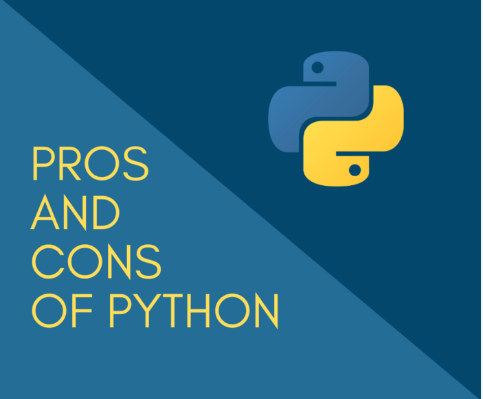Whether you want to build an application, a website, or a PWA, Python is one of the popular and trusted languages. It achieved this position due to its powerful features, ease of use, and flexibility. It ranks among the top five programming languages and beats various traditional languages in the race, like Java, C#, C++, and PHP.
The demand for Python has only grown over time. Organizations widely use Python to meet business requirements and achieve goals.
Python has been around for over 30 years, and its popularity continues to grow. According to a GitHub report, the number of Python developers increased by 22% in just one year, with more than 4 million using it on GitHub alone.
Python has also become very popular among web developers. Meanwhile, the web development community is divided on Python’s effectiveness for creating feature-rich websites. In this article, we’ll look at the pros and cons of Python for web development.
Pros of Python for Web Development
Python offers significant advantages for web development. It’s simple to learn and use, and plenty of helpful libraries and people are available to help. Let’s look at why Python is the best choice for web development, including real-world examples and resources for learning more:
1. Easy to Use and Read
Several factors simplify the use of Python for web development:
Low entry barriers: Python is similar to the English language we use daily. The syntax’s simplicity allows you to work with complex systems while ensuring all elements are related. This enables more inexperienced coders to learn the language and join the programming community faster.
Good visualizations: Various charts and plots are used to present data understandably. They offer an effective way to show and comprehend data visually. Web development firms use Python libraries (such as Matplotlib) to visualize data and create precise, easy-to-understand reports.
2. Asynchronous coding
Python is the best language for quickly developing websites, and it teaches the benefits and drawbacks of web development. Each code unit runs independently, allowing quick responses to various issues and making Python website development a viable option for groups looking to get their product out quickly
3. Wide community support
Python has the largest developer community in the world. So, a solution is available whenever you find a web development problem. Numerous Python courses for web development are available from community members to help make the web development process more accessible.
4. Rich Libraries
Python has numerous libraries for various applications, including web development and machine learning. This extensive library support allows developers to find pre-built code for multiple tasks.
Pandas for data manipulation and analysis and Django for web development provide robust solutions that speed up development and productivity.
5. Enterprise application integration
Python is becoming increasingly popular for enterprise software development and integration due to its flexible competencies.
It can be seamlessly integrated with enterprise-level languages like Java, PHP, and .NET, allowing developers to easily manipulate procedure and protocol implementation.
6. Syntax
Python web development has numerous advantages for server-side scripting, the most fantastic of which is its simple syntax. Simplicity enables customers to expand this system algorithm based solely on the user’s movements and interactions.
7. Use in machine learning and AI
As the popularity of machine learning and artificial intelligence grows, developers are increasingly choosing Python as the language of choice for their projects. Jean Francois Puget, a consultant from IBM’s machine learning division, is one of those who have worked with this language.
8. Productivity
Another benefit of Python is that it can help you become more productive. Its integration and control capabilities can make programs run more efficiently. Python’s dynamic typing and compactness make it more effective than Java and other programming languages.
9. Application scripting and software testing
Python is a powerful scripting language with vital C, C++, and Java integration. Python’s embeddability enabled it to code and extend large apps. Python has a variety of applications, including test automation.
10. Security features
Frameworks like Django come with built-in security features that help protect the application from common security threats such as cross-site scripting and SQL injection.
The active Python community is constantly working to identify and fix security vulnerabilities, which is beneficial for maintaining web application security.
Cons of Python for Web Development
Below is a list of Some cons of using Python for web development:
1. Fewer seasoned developers
You want the most skilled builders to handle the app creation process. However, Python is less truthful because fewer professional programmers are working with it, especially compared to Java.
Also Read: The Cost to Hire a Laravel Developer
2. Too simple
Python’s simplicity has a double edge. While it is simple to learn and get started with, this simplicity can hinder developers from transitioning to languages with more complex syntax, such as Java or C++. Transitioning to more complex languages and the development team’s adaptability can take time.
3. Lack of True Multiprocessor Support
Multiprocessing is an integral part of utility improvement. While useful for multiprocessing, Python is no longer as versatile or clean as other programming languages. This could result in specific limitations while developing programs.
4. Database Errors
Python allows for simple programming; however, some errors occur when integrating with a database. The Python programming language has a crude and immature data set admittance layer. Large enterprises typically require seamless collaboration with complex historical data and do not favor using Python.
5. Not best for cellular utilization
Some web developers claim that Python performs slower on mobile devices than computers or servers.
6. Speed limitations
Python is often chastised for its excessive speed. Because of its various approaches to code translation, it is primarily an interpreted script language, which makes it slower than many compiled counterparts such as C/C++ or Java.
7. Memory Intake
Python is thought to consume a lot of memory while developing large web applications. To put it plainly, Python no longer works well with limited memory.
8. Game development issues
Python is not widely regarded as the best programming language for game development. Python is only sometimes favored due to the gradual development of programs.
9. Design regulations
Python has been chosen to improve specific design constraints. This programming language is dynamically typed, which means it performs targeted activities at particular points during app execution that would not be possible in a statically typed language.
10. Low code reuse
Because of the code’s high reusability, developers find it difficult to code in Python when designing enterprise-level systems. It may give developers the impression that GitHub-like tools will make it easier for programmers and data scientists to archive their code so that others can access and use it.
Conclusion
Choosing the correct language for website development is critical. Python has many benefits, including speed and cost-effectiveness, making it an excellent choice for various projects.
Python can benefit both small startups and large companies. To summarize, Python is an excellent choice for web development, but it, like all languages, has benefits and drawbacks. Knowing both allows you to make an informed decision about your next project. The denver web design agency takes this by integrating security measures into every website.




3 thoughts on “How To Use Python For Web Development – Pros and Cons”